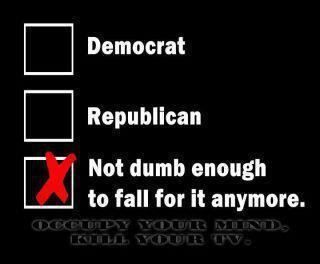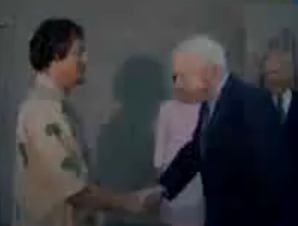All the President’s Psychologists: The American Psychological Association’s Secret Complicity with the White House and US Intelligence Community in Support of the CIA’s 'Enhanced' Interrogation Program.The APA secretly coordinated with officials from the CIA, White House, and the Department of Defense to create an APA ethics policy on national security interrogations that comported with then-classified legal guidance authorizing the CIA torture program. .....
The complicity between APA and government entities appears to have directly influenced the APA ethics policy changes, codified into the June 2005 report of the APA’s Presidential Task Force on Psychological Ethics and National Security (PENS). The PENS report, in combination with associated, past APA ethics code changes, permitted psychologists to take on the roles of monitoring and evaluating the safety and efficacy of the “enhanced” interrogation program. ...
The Gerwehr emails, together with independent documents in the public record, demonstrate that APA’s secret coordination with the Bush administration both generated and critically shaped APA’s 2005 ethics policy on interrogations. .... Presenting misleading information to APA membership, the public, and the press that obscured or falsified the history of complicity with Mitchell and Jessen, the CIA and/or the Bush White House. .....
(memo sent in 2004)
In his memo, addressed to National Security Advisor Condoleezza Rice, Tenet made clear just how high the stakes were during this period and how much conflict appears to have arisen among the leadership prior to his resignation. Tenet reminded the key players of the Administration that they had all approved the program: “From the outset, the policy to employ these techniques against terrorist HVD has been reviewed and endorsed by senior Administration policymakers; in August 2002, the Vice President, the Council to the President, the Attorney General and you were briefed and approved CIA going forward with the Program...” he wrote: “Given all this increased scrutiny now upon us in the wake of treatment of prisoners in Iraq and all the questions the administration is being asked, I strongly believe that the Administration needs to review its previous legal and policy positions with respect to detainees to assure that we all speak in a united and unambiguous voice about the continued wisdom and efficacy of those positions in light of the current controversy.” 15
Soon after Mumford’s “savethe date” was sent, APA’s Ethics Director, Stephen Behnke sent an official invitation to potential participants. Behnke framed the purpose of the meeting as a response to the Abu Ghraib scandal:
Dear Invitee,
Events in our recent history, most notably the terrorist attacks of September 11, 2001 and the Abu Ghraib prison situation, have stimulated a great deal of interest in the ethics of using psychology and psychological techniques as tools in national security investigations. (Email 3)
Behnke reassured invitees that the APA Ethics Office would “neither assess nor investigate the behavior of any specific individual or group.” Instead, Behnke conveyed the APA’s deference to the needs of psychologists in the intelligence community:
The Ethics Office and Science Directorate would like to take a forward looking, positive approach, in which we convey a sensitivity to and appreciation of the important work mental health professionals are doing in the national security arena, and in a supportive way offer our assistance in helping them navigate through thorny ethical dilemmas, if they feel that need (informal conversations with people in the field suggest the need is there).
Behnke further guaranteed that APA would keep the meeting, its participants, and their contributions confidential:
I would like to emphasize that we will not advertise the meeting other than this letter to the individual invitees, that we will not publish or otherwise make public the names of attendees or the substance of our discussions...
Indeed, the substance of the discussions and the names of the attendees at the July 20, 2004 meeting have never been disclosed. 16 Similarly, it is unknown whether followup meetings took place between APA and CIA personnel, although the invitation and subsequent emails refer to the possibility of such meetings.
What is known is that the same day APA leadership was meeting with top national security psychologists from the CIA, the officials at the highest levels of the Bush administration were meeting to address the legality of the enhanced interrogation program: “In a meeting on July 20, 2004, National Security Council principals, including the vice president, provided their authorization for the CIA to use its enhanced interrogation techniques... They also directed the Department of Justice to prepare a legal opinion on whether the CIA's enhanced interrogation techniques were consistent with the Fifth and Fourteenth Amendments to the U.S. Constitution.” 17 The Fifth and Fourteenth Amendments to the U.S. Constitution were central to the U.S. interpretation of what constituted CIDT. 18 ....
n addition, the weekend meeting was attended by numerous unacknowledged observers, whose presence, according to Task Force Chair MooreheadSlaughter, had been vetted by herself and the two Board liaisons who later became APA Presidents, Koocher and Anton. 23 Secret observers included Brandon, recently of the White House, Dr. Mel Gravitz, a psychologist formerly at the National Security Agency, and APA staff members Newman, Mumford, Farberman, Breckler and Dr. Heather Kelly. 24 It is unknown, aside from Brandon (see below), whether these observers contributed to the report, which Task Force ”rapporteur” Stephen Behnke wrote during meeting breaks and in the evenings. As the public record reflects, Behnke finalized the Report and distributed it to the Task Force members six hours after the Task Force meeting ended. ....
Additional pressure on the “enhanced” interrogation program and the use of medical personnel came through the CIA Office of the Inspector General (OIG). At the time, the program faced increasing calls for review and oversight following damaging revelations about the treatment of “ghost detainees.” 34
In May 2004, the OIG recommended that the CIA conduct a study of the effectiveness of the interrogation techniques. In response to OMS concerns that studying the results of these interrogations “would amount to human experimentation,” the OIG issued a clarification in January 2005: I fear there was a misunderstanding. OIG did not have in mind doing additional, guinea pig research on human beings. What we are recommending is that the Agency undertake a careful review of its experience to date in using the various techniques and that it draw conclusions about their safety, effectiveness, etc., that can guide CIA officers as we move ahead. 35 .....
2002: Previous Changes to APA Ethics Code
It is important to note that previous changes to the APA Ethics Code appear to have helped set the stage for psychologists to conduct research on a vulnerable population (e.g. detainees) without their consent. While such conduct has been deemed unethical for health professionals since Nuremberg, the APA ethics code had been revised in 2002 in ways that weakened key research protections established by the Nuremberg Code 42 under customary international law and the Common Rule under US Federal Law. One such change, apparently drafted into the code after 9/11, determined that the requirement to obtain informed consent could be dispensed with when “permitted by law or federal or institutional regulations” (Ethical Standard 8.05: American Psychological Association, 2002b). 4
Other changes, already being considered prior to 9/11 but made APA policy in August 2002, included permitting psychologists to more readily employ deception, restricting only “research that is reasonably expected to cause physical pain or severe emotional distress” (Ethical Standard 8.07), and most strikingly, to fore-go their ethical obligations altogether, if these “conflict with law, regulations, or other governing legal authority” (Ethical Standard 1.02). 44 ....
Email 3: Mumford, July 14, 2004 ..... I would like to emphasize that we will not advertise the meeting other than this letter to the individual invitees, that we will not publish or otherwise make public the names of attendees or the substance of our discussions, and that in the meeting we will neither assess nor investigate the behavior of any specific individual or group. ..... Sincerely, Stephen Behnke Director, APA Ethics Office .....
Sent: Thursday, November 02, 2006 11:16 AM To: Mumford, Geoff ..... 3. In July 2003, the APA and the RAND corp. cohosted a workshop entitled, “Science of Deception: Integration of Practice and Theory,” which was funded by the CIA. Can you tell me who initiated the workshop and provide a little more description of the event? Topics included the use of pharmaceutical truthtelling agents. Can you tell me who led that workshop and what conclusion they arrived at? Katherine Eban
From: Mumford, Geoffrey
Subject: RE: Dinner on the 17th
Date: June 27, 2003 5:44:31 PM EDT
To: kirk hubbard
Cc: Scott Gerwehr (RAND), Susan Brandon (NIH/NIMH)
Kirk,
I concur and only just now saw Scott's reference...glad he's on our side;) Sorry to hear your getting grief about the room but have I got a deal for you...as a special promotion for APA members, who also work in CIA Ops AND are willing to share their last names, I will pull that pawltry (poultry?) room fee out of my policy budget and put you up for the night. This is the very least APA can do given the remarkable generosity your agency has shown in supporting the wrkshop.
Enjoy the weekend!
geoff
Email 12: Hubbard, June 13, 2003 .... If you are looking for another scientist/researcher, a colleague here suggested Richard Rogers, Ph.D. He wrote a book titled "Clinical Assessment of Malingering and Deception" and apparently continues to conduct research in the area of deception. Last we know, he is a Professor of Psychology at the Univ of North Texas. My colleague was impressed by his work, for what it's worth.
Email 15. Hubbard, April 2, 2003
kirk hubbard
To: sbrandon, gmumford, gerwehr
Date: April 2, 2003 2:24 PM RE: Workshop on Science of Deception
Susan, Your reply sounds fine to me.
Pretty slick-you should be handling agents for us!
Another approach in addition to your note might be to find someone like Sternberg, Zimbardo, etc. who knows Ekman and could cajole him. Joe Matarazzo knows him and has called on my behalf before, but I don't know if they have any personal relationship. Joe loves to strong arm people, but I don't know what effect that might have on Ekman. We don't want him to be disruptive at the forum!
Kirk
Complete article 




































